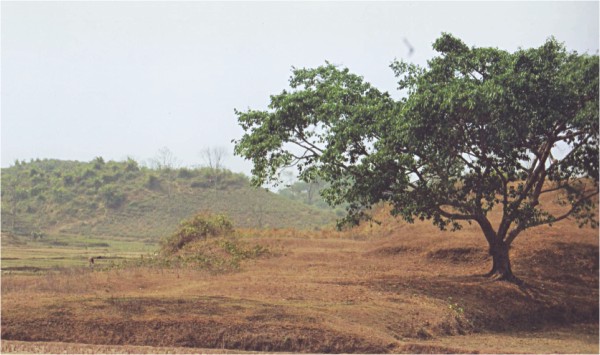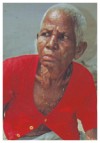
The hills roar with Rebati Mahali's screams
Sixteen-year old Rebati Mahali, daughter of Jogin Mahali, was a female worker at Khadim tea-garden in Sylhet in 1971. Her family resided in a slum of Khadim tea-garden, which was numbered three. They were the descendants of the Mahali tribe, a small group that was spread over Rajshahi, Dinajpur, Rangpur and Bogra. A few members of this tribe worked in the tea-gardens in Sylhet for generations and lived there permanently. Their native tongue was Mahale. Many of them were ignorant in reading, calculating and writing as they did not have any alphabet in Mahale language. Only some of them were taught to read and write by the Christian missionaries in the area.
The Mahalis worked in the tea-gardens and also were experts in craftsmanship. They made different household necessities from bamboo they procured from the bamboo groves.
 Under this Tree Rebati was Killed. Photo: Col Sajjad
Under this Tree Rebati was Killed. Photo: Col Sajjad
 |
|
Aunt of Rebati Mahali |
The Mahalis lived in thatched houses. Rebati lived with her family members in one such house. Being a skilled tea plucker she was faster in her work than many. She dressed in saree and covered her head like the other women of her community did. Mahalis generally wore white saree but often they colored their saree yellow by dipping it in turmeric. The Mahali women liked to wear silver jewellery. Like all other women in her community Rebati had three holes in each ear and she wore large earrings called 'pagra'. She also wore anklets like the others. She wore a necklace with pictures of gods and goddesses, bracelets and armlets and a nose ring. This is how all Mahali women generally dressed. The area where Mahalis lived was nicely surrounded by flowers and at the end of the slum area there was a large tree.
The Mahalis used mats made of date leaves to sleep on and had wooden stools at home. They ate rice, fish, pork, prawn and dry fish. They liked cooking their food with spices and chillies. They also smoked tobacco and drank home made wine.
All Mahali homes were decorated with the wedding picture of the bride and groom of their family. Marriage was an important ceremony in their community during which they danced with the tune of flute and drum and drank profusely.
The Mahalis are divided into 12 tribes. Women had no share in the property. The Mahalis had converted to Christianity about 120 years ago. They also observed and celebrated many Hindu rituals.
In April 1971, Pakistan army captured the Sylhet city and moved into the city. They started inflicting atrocities on the local population. In the month of July, a group of soldiers along with collaborators advanced towards the Mahali slum of Khadim tea-garden. Out of fear the Mahali workers with their children ran towards the tea-garden and hillocks to take cover. It was afternoon time. A Pakistan army officer announced in Urdu something over the mike that was translated in Bengali by a collaborator. They announced that Pakistan army had information that freedom fighters with arms and ammunitions had camped in this slum area and they also knew that the garden workers were providing support to these freedom fighters. The workers were ordered over the mike to come out of their hideouts and to line up in front of the slum. They would all be examined by the army and if no freedom fighter or arms were found among them they would be let free. They were warned, if they did not come out soon from the hide outs the soldiers would set fire to the entire area that would result in their deaths.
Upon hearing this, the workers with their families came out and lined up in front of the slum to avoid bloodbath and burning. The soldiers at this point separated the men from the women. Men were made to stand in two lines and the women and children were all pushed inside the thatched houses. To their horror, the men saw one machine gun was being set up by the soldiers on the high ground in front of them. Before they could understand, the soldiers opened fire at the men standing in the line. Most fell dead and only a few ran and took shelter in the tea-garden. The women and children inside the thatched houses could hear the screaming of their men being killed mercilessly. But they did not understand what lay ahead of them. The soldiers brought petrol from their truck, spread it over the slums and set fire on them. The women and children were somewhat dumbfounded as they had no idea as to how to save themselves.
Rebati watched her mother and few others engulfed by the fire as the women and children began to scream. Brave Rebati made all out effort to break open the bamboo wall of the slum to allow first the children to escape from the fire. She started pushing the children out of the slums. The children ran and took shelter in the tea-garden but many women could not come out. Rebati decided not to run out of the slum but to continue helping the women in distress. From the high ground the army personnel spotted Rebati who was trying to save the others. They caught Rebati and dragged her near the large tree. The soldiers unleashed their anger and hit her and she fell on the ground. The soldiers raped her one by one. Her screams echoed from across the hills and valley. There was no one to help her that day. After committing the heinous crime, the soldiers along with their collaborators left the slum area for more comfortable bungalows of the tea-garden officials.
As the night fell, few Mahali men who could escape death and were hiding inside the tea-garden came near the area. They watched with horror the dead bodies of their fellow workers and relatives. They had nothing to do but shed tears. They were scared that if they tried to cremate the bodies, Pakistan army who were in the nearby bungalow area would come again. They came near the tree and found the body of Rebati Mahali in a pool of blood and without clothes. They understood that she is dead. The Mahalis took their gamchas (thin towel) and spread them over her bloodied dead body and immediately the gamchas were soaked with blood. This was the only respect they could show to this young brave woman.
After this gruesome incident the surviving families of this slum of Khadim tea-garden took shelter in India. They returned after the surrender of Pakistan army in Sylhet. Towards the end of December, 1971, I visited the Mahali slum area. By that time few Mahalis had returned to the village. They told me about the horrendous episodes.
Twenty years later once again I went to the same area. But I could only find the large tree. The area where I found the burnt-out slums was totally abandoned. When I was walking around the area, few Mahalis gathered around me. I told them that twenty years back I had come to this place. Some of the older people recognized me including Thibas Mahahi who was at that time only fifteen years old. Thibas was the Sardar (leader) of the Mahalis in Khadim. I asked him where they lived now. Thibas told that the area where the slum was located in 1971 and was burnt was a cursed area. So they moved a little far away and set up their new home. I was requested to visit their new slum area which I gladly agreed to. After reaching the slum, I asked if there was anyone from Rebati's family present in the slum. The villagers brought an old lady who was the aunt of Rebati Mahali. I asked the Mahalis if they still remembered Rebati Mahali. The Mahalis told me that they could never forget her. One of the elderly ladies said, “How can we forget her as she still visits us?” I requested to know as to how she still visited the tribe. They were confused and were looking at each other as if they were trying to hide something. Finally another old lady told that Rebati came to them on dark nights, emerging from under the large tree where she was violated. Having emerged there, she screamed to the top of her voice, like she did the evening she had been violated and killed. She went on saying that they were so scared at that time that they closed their doors and shivered in fear. It was difficult for me to comprehend the statement. I asked them if I was allowed to come and stay in the slum the next dark night to hear the scream of Rebati. To this the old lady replied that you would hear nothing ''because you are not a Mahali; you have to be a Mahali to understand the pain of Rebati Mahali."
The elderly women of Khadim tea-garden can still hear Rebati's screams among the hills on dark nights. Is it that Rebati's soul is still crying out seeking justice, to punish those who had killed her people and violated her?
Written by Lt Col Sajjad.
©2012 thedailystar.net. All Rights Reserved